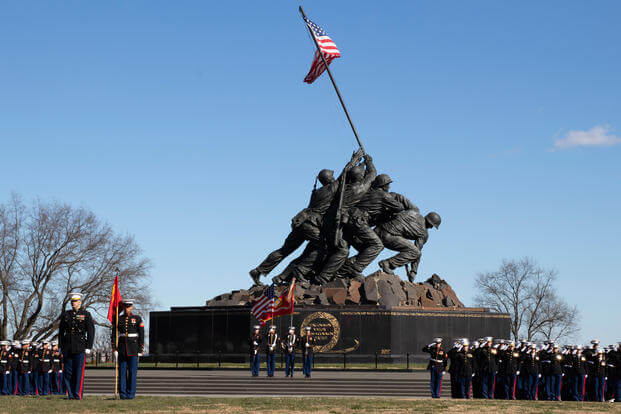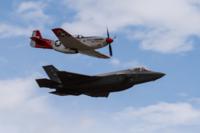At the base of the iconic Marine Corps War Memorial across from Arlington National Cemetery is a relatively recent inscription consisting of just two words: Afghanistan. Iraq.
The memorial, which depicts six troops struggling to raise the American flag on the Japanese island of Iwo Jima's Mount Suribachi, has inscriptions for every campaign that Marines have fought in, beginning with the Revolutionary War: 1775-1783. Each past multi-year campaign includes an end date. But the Afghanistan and Iraq inscriptions are open-ended, a starting year followed by a dash.
To some, it's a mini-memorial to America's "Forever Wars" -- fights that began in 2001 and 2003, respectively, and are still dragging on two decades later.
"Took my parents to the USMC/Iwo Jima Memorial in Arlington this morning," Cheddar show host J.D. Durkin tweeted June 13. "Was particularly struck by the open-ended dates etched for the Afghanistan & Iraq wars."
It now appears that those wars may be coming to a formal, definitive end. President Joe Biden in April ordered a full withdrawal of U.S. troops from Afghanistan by Sept. 11, 2021, and the Pentagon is providing weekly updates on retrograde efforts as troop strength in the country dwindles.
Read Next: Acting SecNav Clears Record of Marine Officer Separated over Scout Sniper Urination Scandal
Meanwhile, the House this month voted to repeal the 2002 Authorization for Use of Military Force in Iraq, a move signaling lawmakers' desire to conclude that chapter of U.S. history, even as a small contingent of American troops remains in Iraq to support the fight against ISIS.
But even as an end date appears in sight for the nation's longest wars, it may be a while until the conclusion is inscribed on the base of the Iwo Jima Memorial.
The memorial, created by sculptor Felix de Weldon and based on the legendary 1945 Associated Press photograph by Joe Rosenthal, was dedicated by President Dwight D. Eisenhower in 1954. The original band of battle honors concluded with the Korean War, 1950.
Other battles were not considered for addition until 1974, when then-President Richard Nixon specifically requested that Vietnam be added, according to an exhaustive history of the memorial compiled by the Historic American Landscapes Survey in 2005. Even after the president's intervention, work did not begin on the addition until 1984.
"For the Vietnam inscription, Harold C. Vogel was hired; his cost estimate was $475," the document states. "At this time, however, it was decided to reference the Lebanon campaigns separately, use the dates 1962-75 for Vietnam, and add the Dominican Republic and Grenada conflicts."
The work, completed in 1985, ultimately cost $6,840. No further inscriptions were added, according to the history, until 1996, when another artisan, Thomas Winkler, was hired to add the dates of the Persian Gulf, Panama and Somalia conflicts.
The open-ended Afghanistan and Iraq Wars did not make their appearance on the memorial until 2017, when Ryan Zinke, President Donald Trump's secretary of the Interior, dedicated the new engravings. The work, which coincided with a thorough refresh of the memorial that included cleaning, re-gilding and waxing, was funded by a private $5.37 million donation from David M. Rubenstein, the billionaire co-founder of private equity firm The Carlyle Group.
"As the deputy commander of Special Forces in Iraq and retired Navy SEAL, I saw the commitment, patriotism and fortitude that American service members and their families display while serving our country. It's a great honor to be a part of memorializing the Marines of the Global War on Terror," Zinke said at the memorial's rededication. "Our warriors who serve in Iraq and Afghanistan see more frequent deployments as our nation has been in sustained combat for longer than at any previous point in our nation's history. The Iraq and Afghanistan veterans are warriors in the field and leaders in the community. I salute them and am grateful for their service."
Historically, the memorial has evolved in bursts driven by individual initiative. So it's unsurprising that queries about the next update did not receive a straightforward or immediate answer. Military.com questions to the Marine Corps were first forwarded to the Corps' history division and then to the National Park Service, which has maintained the memorial site since 1955. Ultimately, they were sent back to Marine Corps headquarters for a response that contained a second rerouting.
"Campaign completion dates are set by the Department of Defense," Maj. Jorge Hernandez said in a statement. "At this time, formal campaign end dates have not yet been established for campaigns involving Marines in Iraq and Afghanistan so the Marine Corps war memorial cannot be updated. For questions regarding these campaigns and the implementation of these dates to be featured in official memorials, please contact the Department of Defense and the National Park Service."
Queries to the Pentagon about how the Defense Department finalizes a military campaign's end dates were forwarded to the Joint Staff, which did not respond.
Ultimately, history indicates that, while the nation's Forever Wars may be ending, the inscription on the Marine Corps War Memorial could remain unfinished for months or even years beyond their formal conclusion.
-- Hope Hodge Seck can be reached at hope.seck@military.com. Follow her on Twitter at @HopeSeck.
Related: Marine Corps Announces It Was Wrong -- Again -- on Iwo Jima Flag-Raising Photo














